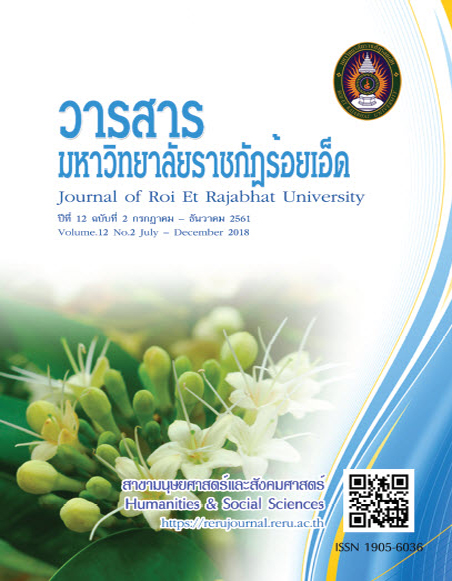Causal Factors Affecting Self-Management towards Mathematical Learning of the Sixth-Grade Students in Khon Kaen Primary Educational Service Area Office 1
Keywords:
Self-management, Learning, MathematicAbstract
The purposes of this study were to study the correlation among variables which are selfefficacy, planning, control and responsibility to build and develop the model of causal factors that affect self-management of the sixth-grade students towards mathematical learning in Khon Kaen Primary Educational Service Area Office 1. The control group is 360 sixth-grade students from 17 schools in Khon Kaen Primary Educational Service Area Office 1, using Multi-stage Random Sampling. The research instrument is a five-level evaluating form in Rating Scale of causal factors affecting self-management in mathematical learning which is divided into two parts. The focal content in the first part is the causal factors that affect self-management towards mathematical learning which comprise of four aspects. To elaborate, there are 15 items discussed in each aspect, thus overall sixty items in this part. In the second part, the focal point is in self-management towards Mathematical learning. The discriminant index (rxy) calculated starts from .23-.81. The reliability coefficients start from .80-.90. In terms of data analysis, Path Analysis is applied by using position analysis questionnaire (PAQ). The research result can be shown as follow : 1. The direct influential invariables towards self-management in Mathematical learning are Planning (X2) and Self-Efficacy (X1). 2. The direct and indirect influential invariables towards self-management in Mathematical learning are Control (X3) and Responsibility (X4).
References
ฉวีวรรณ เศวตมาลย์. (2545). การพัฒนาหลักสูตรคณิตศาสตร์. กรุงเทพฯ: สุวีริยาสาส์น.
เซอร์โต และซามูเอล ซี. (2552). การจัดการสมัยใหม่. กรุงเทพฯ: เพียร์สัน เอ็ดดูเคชั่น อินโดไชน่า.
ดรัคเกอร์ และปีเตอร์ เอฟ. (2545). จัดการตนและประเมินตัวเองตามแนวดรักเกอร์. กรุงเทพฯ: บริษัทแปลนพริ้นติ้งจำกัด.
ตุลา มหาพสุธานนท์. (2554). หลักการจัดการ. กรุงเทพฯ: เอ.อาร์.บิซิเนสเพรส.
ทิพวรรณ กิตติพร. (2545). วิกฤตคุณภาพคน : แนวทางในการแก้ไขและพัฒนา. วารสารมนุษยศาสตร์และสังคมศาสตร์ มหาวิทยาลัยนเรศวร, 10(2), 40-46.
บุญชม ศรีสะอาด. (2553). การวิจัยเพื่อแก้ปัญหาและพัฒนาผู้เรียน. กรุงเทพฯ: สุวีริยาสาส์น.
มัลลิกา ต้นซ้อน. (2544). การจัดการยุคใหม่. กรุงเทพฯ: บริษัท เอ็กซเปอร์เน็ท จำกัด.
วิจารณ์ พานิช. (2556). ครูเพื่อศิษย์สร้างห้องเรียนกลับทาง. กรุงเทพฯ: บริษัท เอส.อาร์.พริ้นติ้งแมสโปรดักส์ จำกัด.
สมโภชน์ เอี่ยมสุภาษิต. (2553). ทฤษฎีและเทคนิคการปรับพฤติกรรม (พิมพ์ครั้งที่ 7). กรุงเทพฯ: จุฬาลงกรณ์มหาวิทยาลัย.
สำนักงานเขตพื้นที่การศึกษาประถมศึกษาขอนแก่น เขต 1. (2557). รายงานการประเมินผลสัมฤทธิ์ทางการเรียนของ นักเรียน (O–NET) ปีการศึกษา 2557. ขอนแก่น: สำนักงานเขตพื้นที่การศึกษาประถมศึกษาขอนแก่น เขต 1.
อนันต์ เกตุวงศ์. (2541). หลักและเทคนิคการวางแผน. กรุงเทพฯ: พิมพลักษณ์.
อรวรรณ พาณิชปฐมพงศ์. (2542). ผลของการใช้กระบวนการกลุ่มสัมพันธ์เพื่อพัฒนาการควบคุมตนเองของนักเรียน ชั้นประถมศึกษาปีที่ 5 โรงเรียนอนุบาลชัยภูมิ อำเภอเมือง จังหวัดชัยภูมิ. วิทยานิพนธ์ ศึกษาศาสตรมหาบัณฑิต. ขอนแก่น: มหาวิทยาลัยขอนแก่น.
Bandura, Albert. (1977). Self-efficacy : Toward a Unifying Theory of Behavior. Psychological Review. 84(2), 191-215.
_____________. (1986).Social Foundation of thought and Action : A Social Cognitive Theory. Engewood Cliffs, NJ : Prentice-Hall.
_____________. (1994). Self-efficacy. in V.S. Ramachandran (ED.), Encyclopedia of Human Behavior. New York: Academic Press.
Heo, Heeok. (1998). The Effect of Self- Regulated Learning Strategies on Learner Achievement and Perceptions on Person Learning Responsibility. Dissertation for the Degree of Doctor of Philosophy. U.S.A. : The Florida State University.
Prawpan Suriwong. (2558). เด็กไทยติด สมาร์ทโฟน. สืบค้นเมื่อ 26 กุมภาพันธ์ 2558, จาก https://www.thaihealth.or.th/Content/27585-เด็กไทยติด
Robison, Simon and Dowson, Paul. (2011). Responsibility and Integrity in the Curriculum. Jour of Global Responsibility. 2(2), 253-268.
Yorke, M. and P. Knight. (2004). Embedding Employability in the Curriculum. New York: Learning and Teaching Support.
Downloads
Published
How to Cite
Issue
Section
License
บทความที่ได้รับการตีพิมพ์เป็นลิขสิทธิ์ของวารสารมหาวิทยาลัยราชภัฎร้อยเอ็ด
ข้อความที่ปรากฏในบทความแต่ละเรื่องในวารสารวิชาการเล่มนี้เป็นความคิดเห็นส่วนตัวของผู้เขียนแต่ละท่านไม่เกี่ยวข้องกับมหาวิทยาลัยราชภัฎร้อยเอ็ด และคณาจารย์ท่านอื่นๆในมหาวิทยาลัยฯ แต่อย่างใด ความรับผิดชอบองค์ประกอบทั้งหมดของบทความแต่ละเรื่องเป็นของผู้เขียนแต่ละท่าน หากมีความผิดพลาดใดๆ ผู้เขียนแต่ละท่านจะรับผิดชอบบทความของตนเองแต่ผู้เดียว





